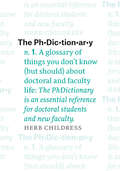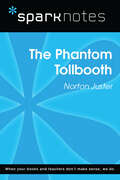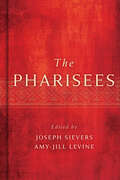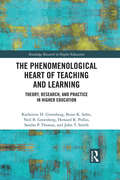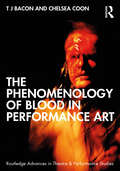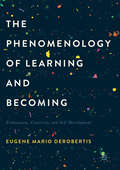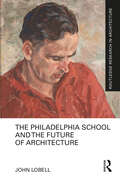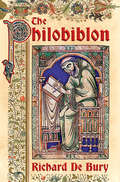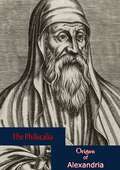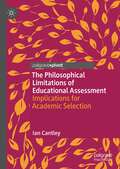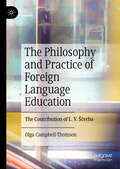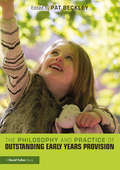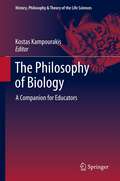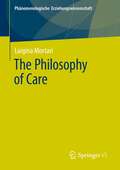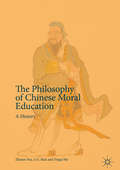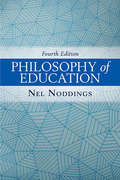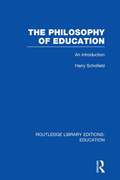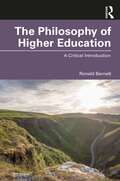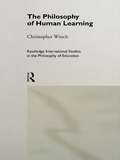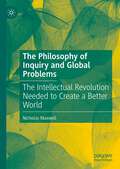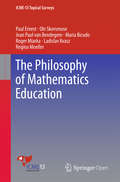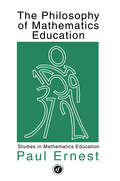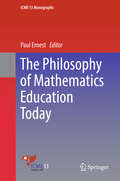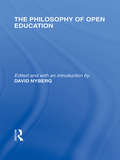- Table View
- List View
The PhDictionary: A Glossary of Things You Don't Know (but Should) about Doctoral and Faculty Life
by Herb ChildressNavigating academia can seem like a voyage through a foreign land: strange cultural rules dictate everyday interactions, new vocabulary awaits at every turn, and the feeling of being an outsider is unshakable. For students considering doctoral programs and doctoral students considering faculty life, The PhDictionary is a lighthearted companion that illuminates the often opaque customs of academic life. With more than two decades as a doctoral student, college teacher, and administrator, Herb Childress has tripped over almost every possible misunderstood term, run up against every arcane practice, and developed strategies to deal with them all. He combines current data and personal stories into memorable definitions of 150 key phrases and concepts graduate students will need to know (or pretend to know) as they navigate their academic careers. From ABD to white paper--and with buyout, FERPA, gray literature, and soft money in between--each entry contains a helpful definition and plenty of relevant advice. Wry and knowledgeable, Childress is the perfect guide for anyone hoping to scale the ivory tower.
The Phantom Tollbooth (SparkNotes Literature Guide Series)
by SparkNotesThe Phantom Tollbooth (SparkNotes Literature Guide) by Norton Juster Making the reading experience fun! Created by Harvard students for students everywhere, SparkNotes is a new breed of study guide: smarter, better, faster. Geared to what today's students need to know, SparkNotes provides: *Chapter-by-chapter analysis *Explanations of key themes, motifs, and symbols *A review quiz and essay topicsLively and accessible, these guides are perfect for late-night studying and writing papers
The Pharisees
by Joseph Sievers and Amy-Jill Levine, editorsA multidisciplinary appraisal of the Pharisees: who they were, what they taught, and how they&’ve been understood and depicted throughout historyFor centuries, Pharisees have been well known but little understood—due at least in part to their outsized role in the Christian imagination arising from select negative stereotypes based in part on the Gospels. Yet historians see Pharisees as respected teachers and forward-thinking innovators who helped make the Jewish tradition more adaptable to changing circumstances and more egalitarian in practice. Seeking to bridge this gap, the contributors to this volume provide a multidisciplinary appraisal of who the Pharisees actually were, what they believed and taught, and how they have been depicted throughout history. The topics explored within this authoritative resource include:the origins of the Phariseesthe meaning of the name &“Pharisee&”Pharisaic leniency, relative to the temple priesthood, in judicial mattersPharisaic concerns for the Jewish laityPharisaic purity practices and why they became popularthe varying depictions of Pharisaic practices and beliefs in the New TestamentJesus&’s relationship to the Phariseesthe apostle Paul and his situation within the Pharisaic traditionthe question of continuity between the Pharisaic tradition and Rabbinic Judaismthe reception history of the Pharisees, including among the rabbis, the church fathers, Rashi, Maimonides, Luther, and Calvinthe failures of past scholarship to deal justly with the Phariseesthe representations, both positive and negative, of the Pharisees in art, film, passion plays, and Christian educational resourceshow Christian leaders can and should address the Pharisees in sermons and in Bible studiesFollowing the exploration of these and other topics by a team of internationally renowned scholars, this volume concludes with an address by Pope Francis on correcting the negative stereotypes of Pharisees that have led to antisemitic prejudices and finding resources that &“will positively contribute to the relationship between Jews and Christians, in view of an ever more profound and fraternal dialogue.&”Contributors: Luca Angelelli, Harold W. Attridge, Vasile Babota, Shaye J. D. Cohen, Philip A. Cunningham, Deborah Forger, Paula Fredriksen, Yair Furstenburg, Massimo Grilli, Susannah Heschel, Angela La Delfa, Amy-Jill Levine, Hermut Löhr, Steve Mason, Eric M. Meyers, Craig E. Morrison, Vered Noam, Henry Pattarumadathil, Adele Reinhartz, Jens Schröter, Joseph Sievers, Matthias Skeb, Abraham Skorka, Günter Stemberger, Christian Stückl, Adela Yarbro Collins, and Randall Zachman.
The Phenomenological Heart of Teaching and Learning: Theory, Research, and Practice in Higher Education (Routledge Research in Higher Education)
by John Smith Katherine Greenberg Brian Sohn Neil Greenberg Howard R Pollio Sandra ThomasThis book presents a carefully constructed framework for teaching and learning informed by philosophical and empirical foundations of phenomenology. Based on an extensive, multi-dimensional case study focused around the ‘lived experience’ of college-level teaching preparation, classroom interaction, and students’ reflections, this book presents evidence for the claim that the worldviews of both teachers and learners affect the way that they present and receive knowledge. By taking a unique phenomenological approach to pedagogical issues in higher education, this volume demonstrates that a truly transformative learning process relies on an engagement between consciousness and the world it ‘intends’.
The Phenomenology of Blood in Performance Art (Routledge Advances in Theatre & Performance Studies)
by T. J. Bacon Chelsea CoonThe Phenomenology of Blood in Performance Art is a major new publication that expands the philosophical contextualisation of blood, its presence and absence, across the practice of performance art from a phenomenological perspective.Edited by T. J. Bacon (she/they) and Chelsea Coon (she/her), this book moves through an established cannon of artists and beyond to ensure an inclusive representation of practices from a wider range of practitioners. First-hand interviews and conversations have been gathered from both canonical names as well as individuals who are prevalent in their communities and/or respective subcultures, but less represented within the frameworks of scholarly discourse. Each offers the opportunity to examine their experiences creating artworks and in turn contributes to the context of phenomenological examination within this publication through complementary scholarly texts from leading thinkers who frame phenomenological application to both visual art and transdisciplinary context. Featuring artists through new exclusive interviews and contributions including Marina Abramović, Jelili Atiku, Ron Athey, Franko B, Niya B, Marisa Carnesky, Chelsea Coon, Victor Martinez Diaz, Rufus Elliot, Ernst Fischer, Louis Fleischauer, Poppy Jackson, Mirabelle Jones, Andrei Molodkin, Hermann Nitsch, ORLAN, Mike Parr, Greta Sharp, tjb and Paola Paz Yee, and reference to many more. Alongside new scholarly insight by leading phenomenological and interdisciplinary art scholars and philosophers including T. J. Bacon, Chelsea Coon, Stuart Grant, Kelly Jordan, Lynn Lu, Roberta Mock, Amber Musser and Raegan Truax. Together they represent a significant exploration of intricate and dynamic responses to the cultural fabric of contemporary lived experiences across space and time through the medium of blood in performance art.This incredible analysis of this performance art will be of huge interest to students and practitioners of live art, performance art, phenomenology, and performance philosophy.
The Phenomenology of Learning and Becoming: Enthusiasm, Creativity, and Self-Development
by Eugene Mario DerobertisIn this text, the history of phenomenological research on learning is synthesized and brought forward into the areas of existential learning, the development of enthusiasm about learning (from childhood through adulthood), and paradigmatic creative experience. Original research findings are derived using the Giorgi method of descriptive phenomenological analysis in psychology. The results, structural and eidetic in nature, are then integrated from a holistic developmental viewpoint: that of Existential-Humanistic Self-Development Theory (EHSDT). An evolving developmental partnership between learning and creativity emerges as the proper conceptual frame for considering optimal growth and the relative maturity of situated becoming oneself (i.e., the process of self-cultivation). The resulting perspective is supported by cutting edge trends in neuroscience and related to pedagogy and education.
The Philadelphia School and the Future of Architecture (Routledge Research in Architecture)
by John LobellFlourishing from 1951 to 1965, the Philadelphia School was an architectural golden age that saw a unique convergence of city, practice, and education, all in renewal. And it was a bringing together of architecture, city and regional planning, and landscape architecture education under the leadership of Dean G. Holmes Perkins. During that time at the architecture school at the University of Pennsylvania (known as the Graduate School of Fine Arts or GSFA), Louis Kahn and Robert Venturi were transforming modern architecture; Romaldo Giurgola was applying continental philosophy to architectural theory; Robert Le Ricolais was building experimental structures; Ian McHarg was questioning Western civilization and advancing urban and regional ecology; Herbert Gans was moving into Levittown; and Denise Scott Brown was forging a syncretism of European and American planning theory and discovering popular culture. And in the city, Edmund Bacon was directing the most active city planning commission in the country. This book describes the history of the school, the transformation of the city of Philadelphia, and the philosophy of the Philadelphia School in the context of other movements of the time, and looks at what the Philadelphia School has to offer to architecture today and in the future, all from the point of view of a student who was there.
The Philobiblon: A Treatise On The Love Of Books
by Richard De Bury"Will always hold an honorable place for bibliophiles." — The University of Chicago PressOne of the earliest treatises on the value of preserving neglected manuscripts, building a library, and book collecting, Richard De Bury's The Philobiblon was written in 1345 and circulated widely in manuscript form for over a century. The first printed edition appeared in Cologne in 1473, and several others soon followed as the invention of the printing press spread throughout the late Medieval world. The chapter titles of this legendary work reflect its nature, combining the author's love for and commitment to the importance of books and the knowledge they contain with thoughts on collecting them, lending them, teaching with them, and simply enjoying them: "That the Treasure of Wisdom is chiefly contained in books," "What we are to think of the price in the buying of books," "Who ought to be special lovers of books," and "Of the manner of lending all our books to students." The Prologue ends with the following thought: "And this treatise (divided into twenty chapters) will clear the love we have had for books from the charge of excess, will expound the purpose of our intense devotion, and will narrate more clearly than light all the circumstances of our undertaking. And because it principally treats of the love of books, we have chose after the fashion of the ancient Romans fondly to name it by a Greek word, Philobiblon."This volume offers modern bibliophiles a splendid edition of one of the first books ever to study, define, and, above all, praise their passion: the all-encompassing love of books.
The Philocalia
by George Lewis Origen Of AlexandriaThe Philocalia by Origen of Alexandria is a profound compilation of theological and exegetical insights from one of the most influential early Christian scholars. Compiled by Basil the Great and Gregory of Nazianzus in the 4th century, this work gathers essential excerpts from Origen’s extensive writings, presenting his thoughts on Scripture interpretation, theology, and the spiritual life in a concise and accessible format. Philocalia—meaning “love of the beautiful”—reflects Origen’s belief that the pursuit of truth and divine wisdom is an act of spiritual beauty.This collection covers a range of topics essential to early Christian thought, including the relationship between faith and reason, the nature of God, the interpretation of difficult scriptural passages, and the practice of spiritual discipline. Origen’s emphasis on allegorical and mystical readings of Scripture offers a unique window into how early Christian thinkers engaged with sacred texts, seeking deeper spiritual meaning beyond the literal words.The text also addresses central theological questions, such as the problem of evil, the purpose of suffering, and humanity’s role in the divine plan. Origen’s innovative ideas—many of which were later debated or contested—reveal his bold attempt to reconcile Greek philosophy with Christian doctrine, providing valuable insight into the intellectual currents shaping early Christianity.The Philocalia is a treasure for those interested in patristics, theology, and the history of biblical exegesis. Through the efforts of Basil and Gregory, this work preserves the essence of Origen’s thought, allowing readers to explore the intellectual and spiritual depth of a towering figure in early Christianity. Whether as a tool for study or personal reflection, The Philocalia invites believers to seek the beauty of divine truth and wisdom through a deeper engagement with Scripture and the life of the mind.
The Philosophical Limitations of Educational Assessment: Implications for Academic Selection
by Ian CantleyThis book uses philosophical analysis to argue that there are tensions associated with using results of high stakes tests to predict students’ future potential. The implications of these issues for the interpretation of test scores in general are then elucidated before their connotations for academic selection are considered. After a brief overview of the history of academic selection in the United Kingdom, and a review of evidence pertaining to its consequences, it is argued that the practice of using the results of contemporary high stakes tests to make important decisions about students incurs logical and moral problems that a conscientious educator cannot ignore. The gravity of the moral transgression depends on the purpose and significance of the test and, in the case of high stakes tests used for academic selection purposes, it is argued that, not only can the moral wrong be highly significant, but better solutions are within reach.
The Philosophy and Practice of Foreign Language Education: The Contribution of L. V. Ščerba
by Olga Campbell-ThomsonThis volume brings the writings of Russian linguist Lev Vladimirovič Ščerba (1880–1944) to English-language readers for the first time. The collection includes key essays in which Ščerba addresses the issues of educational methodology for foreign languages, contextualised with a critical introduction and commentary, as well as an extensive bibliography of further reading. In the historical context of linguistic scholarship, Ščerba’s work is closely interlinked with major developments in the field of modern language studies in Western Europe at the turn of the twentieth century as well as with the Russian educational tradition. By studying Ščerba’s writing, it is possible to trace the foundational linguistic impetus for the development of this field of scholarship, as well as educational concerns that have since been integrated in the programme of modern language studies. The ideas advanced in Ščerba’s texts remain directly relevant today to policy-makers, teacher trainers, methodologists, and foreign language practitioners. They should be of particular interest to readers in Anglophone countries where foreign languages remain on the periphery of all levels of education. This book will enable English language readers to engage in their own critical reflection on Ščerba’s texts.
The Philosophy and Practice of Outstanding Early Years Provision
by Pat BeckleyThis book examines the philosophical and theoretical foundations of early years practice, and supports practitioners as they reflect on the collective and personal rationales which motivate and inform their work with young children. Theoretical underpinnings are explored from a variety of perspectives, and are translated into effective strategies for application in a range of early years settings. Featuring contributions from leading early years professionals, The Philosophy and Practice of Outstanding Early Years Provision draws on sound expertise to deepen the reader’s understanding of the concepts and ideas behind everyday practice. The book is divided into four easily navigated sections which explore key issues including the creation of enabling environments, leadership in the early years, the opportunities and challenges presented by diversity, and the value of creative approaches. Recommended strategies are discussed in relation to emerging global pressures and the needs of the contemporary child, inviting practitioners to modify and enhance future behaviour and practice. This will be essential reading for students and practitioners who wish to improve current and future practice by gaining insight into the philosophical foundations which underpin outstanding provision.
The Philosophy of Biology
by Kostas KampourakisThis book brings together for the first time philosophers of biology to write about some of the most central concepts and issues in their field from the perspective of biology education. The chapters of the book cover a variety of topics ranging from traditional ones, such as biological explanation, biology and religion or biology and ethics, to contemporary ones, such as genomics, systems biology or evolutionary developmental biology. Each of the 30 chapters covers the respective philosophical literature in detail and makes specific suggestions for biology education. The aim of this book is to inform biology educators, undergraduate and graduate students in biology and related fields, students in teacher training programs, and curriculum developers about the current state of discussion on the major topics in the philosophy of biology and its implications for teaching biology. In addition, the book can be valuable to philosophers of biology as an introductory text in undergraduate and graduate courses.
The Philosophy of Care (Phänomenologische Erziehungswissenschaft #11)
by Luigina MortariCare is the most important thing for life, since to model life we need to care for ourselves, for the others, and for the human institutions. Care is the most important ontological phenomenon because we are what we care for. It is essential to care for life in order to maintain it along time, to make it flourish and to repair the wounds of being-there.This book develops a philosophy of care not only by considering the contemporary literature, but above all by basing the argumentations on the ancient Greek philosophy. Moreover, the argumentations are grounded in a phenomenological analysis of the experience of care.
The Philosophy of Chinese Moral Education: A History
by A. G. Rud Zhuran You Yingzi HuThe book depicts a unique historical and cultural phenomenon, the philosophy of Chinese moral education, in an attempt to capture the essence of Chinese culture. While tracing the historical journey of this philosophy, the book rearranges and interprets the conceptual frameworks concerning moral education in various Chinese philosophical schools and religions. In so doing, it summarizes the ideas of human relations, man and nature, cosmology, moral virtues, and educational approaches, posing intriguing questions about how they have influenced Chinese characteristics, social norms, and value orientations. In particular, the book brings up discussions on the culture of family and state, the challenges that the philosophy had encountered in early modern and present China, as well as the prospect of regeneration of the philosophy and its significance for our world today. This is the book to read if you want to have a deep understanding about China and its belief and educational system.
The Philosophy of Education
by Nel NoddingsThe first edition of Nel Noddings' Philosophy of Education was acclaimed as the "best overview in the field" by the journal Teaching Philosophy and predicted to "become the standard textbook in philosophy of education" by Educational Theory. This classic text, originally designed to give the education student a comprehensive look at philosophical thought in relation to teaching, learning, research, and educational policy, has now been updated to reflect the most current thinking in the field. A revised chapter on Logic and Critical Thinking makes the topic more accessible to students and examines how critical thinking plays a role in light of the new Common Core standards. Philosophy of Education introduces students to the evolution of educational thought, from the founding fathers to contemporary theorists, with consideration of both analytic and continental traditions. This is an essential text not only for teachers and future teachers, but also for anyone needing a survey of contemporary trends in philosophy of education.
The Philosophy of Education
by NoddingsThe first edition of Nel Noddings’ Philosophy of Education was acclaimed as the "best overview in the field” by the journal Teaching Philosophy and predicted to "become the standard textbook in philosophy of education” by Educational Theory. This classic text, originally designed to give the education student a comprehensive look at philosophical thought in relation to teaching, learning, research, and educational policy, has now been updated to reflect the most current thinking in the field. A revised chapter on Logic and Critical Thinking makes the topic more accessible to students and examines how critical thinking plays a role in light of the new Common Core standards. Philosophy of Education introduces students to the evolution of educational thought, from the founding fathers to contemporary theorists, with consideration of both analytic and continental traditions. This is an essential text not only for teachers and future teachers, but also for anyone needing a survey of contemporary trends in philosophy of education.
The Philosophy of Education: An Introduction (Routledge Library Editions: Education)
by Harry SchofieldThere are many students who find philosophy of education difficult, because they have never received teaching in the basic essentials of general philosophy. This book begins by asking the basic question ‘what is philosophy?’ and examines a number of possible answers. Step by step the reader is introduced to the modern techniques of linguistic and concept analysis. Whenever a technical term is used it is explained and illustrated by reference to familiar situations in everyday life.
The Philosophy of Higher Education: A Critical Introduction
by Ronald BarnettProviding a comprehensive introduction to the philosophy of higher education this book steps nimbly through the field, leading it into new areas and advancing an imaginative ecological realism. Each chapter takes the form of a short essay, tackling a particular topic such as values, knowledge, teaching, critical thinking and social justice. It also examines key issues including academic freedom, the digital university and the Anthropocene, and draws on classic as well as contemporary texts in the field. Composed of five parts, the book travels on a compelling journey: Part one identifies foundations of the field, distinguishing between the ideas of university and higher education, Part two examines key concepts, including research, culture, academic freedom and reason, Part three focuses on higher education as a set of educational practices and being a student, Part four is concerned with the university as an institution and includes the matters of leadership and the spirit of the university, Part five turns to the university in the world, and argues for an ecological perspective. Written in a lively and accessible style, and ideal for anyone coming to the field for the first time but also of interest to experienced scholars, this book offers sightings of new possibilities for higher education and the university.
The Philosophy of Human Learning (Routledge International Studies in the Philosophy of Education #Vol. 3)
by Christopher WinchThe Philosophy of Human Learning addresses current concerns with the nature of human learning from a distinctive philosophical perspective. Using insights derived from the work of Wittgenstein, it mounts a vigorous attack on influential contemporary accounts of learning, both in the 'romantic' Rousseauian tradition and in the 'scientific' cognotivist tradition. These two schools, Professor Winch argues, are more closely related than is commonly realised.
The Philosophy of Inquiry and Global Problems: The Intellectual Revolution Needed to Create a Better World
by Nicholas MaxwellUniversities have long been dominated by a philosophy of inquiry that may be called knowledge-inquiry. This holds that, in order to do justice to the basic humanitarian aim of helping to promote human welfare, academic inquiry must, in the first instance, seek knowledge and technological know-how. First, knowledge is to be acquired; once acquired, it can be applied to help promote human welfare. But this philosophy of knowledge-inquiry is an intellectual and humanitarian disaster. It violates three of the four most elementary rules of rational problem solving conceivable, and as a result fails to give priority to the task of helping humanity resolve those conflicts and problems of living, such as the climate and nature crises, that need to be resolved if we are to make progress to a better world – a world in which there is peace, democracy, justice, liberty, and sustainable prosperity, for all. Very few academics today are aware of this rationality scandal. We urgently need to bring about a revolution in universities around the world, wherever possible, so that academic inquiry puts all four rules of rational problem solving into practice, and becomes rationally devoted to helping humanity learn how to make progress towards a better world. Knowledge-inquiry needs to become wisdom-inquiry, rationally devoted to helping humanity create a wiser world.
The Philosophy of Mathematics Education
by Paul Ernest Ole Skovsmose Jean Paul van Bendegem Maria Bicudo Roger Miarka Ladislav Kvasz Regina MoellerAlthough many agree that all teaching rests on a theory of knowledge, there has been no in-depth exploration of the implications of the philosophy of mathematics for education. This is Paul Ernest's aim. Building on the work of Lakatos and Wittgenstein it challenges the prevalent notion that mathematical knowledge is certain, absolute and neutral, and offers instead an account of mathematics as a social construction. This has profound educational implications for social issues, including gender, race and multiculturalism; for pedagogy, including investigations and problem solving; and challenges hierarchical views of mathematics, learning and ability. Beyond this, the book offers a well-grounded model of five educational ideologies, each with its own epistemology, values, aims and social group of adherents. An analysis of the impact of these groups on the National Curriculum results in a powerful critique, revealing the questionable assumptions, values and interests upon which it rests. The book finishes on an optimistic note, arguing that pedagogy, left unspecified by the National Curriculum, is the way to achieve the radical aims of educating confident problem posers and solvers who are able to critically evaluate the social uses of mathematics.
The Philosophy of Mathematics Education (Studies In Mathematics Education Ser. #No. 1)
by Paul ErnestAlthough many agree that all teaching rests on a theory of knowledge, there has been no in-depth exploration of the implications of the philosophy of mathematics for education. This is Paul Ernest's aim. Building on the work of Lakatos and Wittgenstein it challenges the prevalent notion that mathematical knowledge is certain, absolute and neutral, and offers instead an account of mathematics as a social construction. This has profound educational implications for social issues, including gender, race and multiculturalism; for pedagogy, including investigations and problem solving; and challenges hierarchical views of mathematics, learning and ability. Beyond this, the book offers a well-grounded model of five educational ideologies, each with its own epistemology, values, aims and social group of adherents. An analysis of the impact of these groups on the National Curriculum results in a powerful critique, revealing the questionable assumptions, values and interests upon which it rests. The book finishes on an optimistic note, arguing that pedagogy, left unspecified by the National Curriculum, is the way to achieve the radical aims of educating confident problem posers and solvers who are able to critically evaluate the social uses of mathematics.
The Philosophy of Mathematics Education Today (ICME-13 Monographs)
by Paul ErnestThis book offers an up-to-date overview of the research on philosophy of mathematics education, one of the most important and relevant areas of theory. The contributions analyse, question, challenge, and critique the claims of mathematics education practice, policy, theory and research, offering ways forward for new and better solutions. The book poses basic questions, including: What are our aims of teaching and learning mathematics? What is mathematics anyway? How is mathematics related to society in the 21st century? How do students learn mathematics? What have we learnt about mathematics teaching? Applied philosophy can help to answer these and other fundamental questions, and only through an in-depth analysis can the practice of the teaching and learning of mathematics be improved. The book addresses important themes, such as critical mathematics education, the traditional role of mathematics in schools during the current unprecedented political, social, and environmental crises, and the way in which the teaching and learning of mathematics can better serve social justice and make the world a better place for the future.
The Philosophy of Open Education (International Library of the Philosophy of Education Volume 15)
by David Nyberg'Open', 'informal', and 'humanistic' are words used to describe new styles of education which depart from ordinary or traditional education. Too often, however, these adjectives are used in a strongly polemical or self-justifying rather than analytical way. Often too, the grounds for accepting or rejecting open education are political or moral, instead of being based on a consideration of the nature of open education and its strength and weaknesses. This collection of essays is central to the debate on open education, analyzing the important concepts in the field. The contributions, all written by authorities on the philosophy of education, deal with problems of definition, knowledge, socialization, freedom, cultural perspective, and unique meanings and metaphors.
